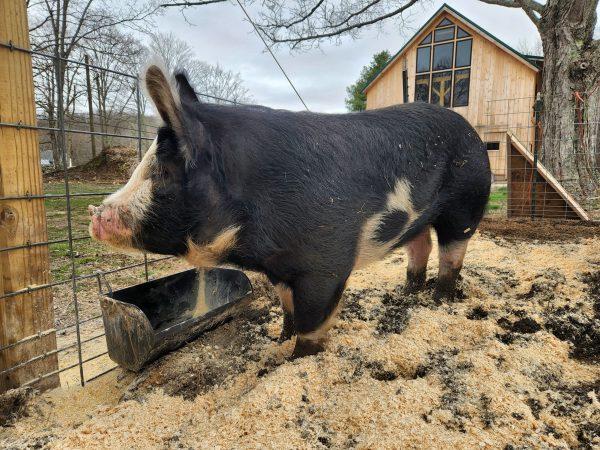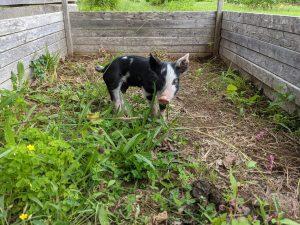-
About
- Leadership & Faculty
- News & Events
-
Academics
- Graduate
- Advanced Clinical Training
- Continuing Education
- Academic Departments
- Academic Offices
- Simulation Experiences
-
Student Life
- Offices
-
Research
-
Hospitals & Clinics
- Emergency Care
- Hospital Services
-
Community Outreach
- Volunteer
A Fine Swine
Following a brain injury, piglet Spot becomes welcoming mascot at Long Table Farm

Late one June night at Long Table Farm in Lyme, Connecticut, owners Baylee Drown and Ryan Quinn responded to a piglet’s squeal. Quinn found Spot, a week-old purebred Berkshire pig, underneath her mom, Munchie.
“She was not breathing but her heart was beating,” Drown recalls. Quinn provided therapeutic breath for Spot, and she resumed breathing and wiggling, according to Drown. “He put her back in the litter and she started nursing. We thought the crisis had been averted.”
Unfortunately, Spot exhibited poor coordination and shaking the next day. “We isolated her and called Tufts [Cummings School of Veterinary Medicine],” Drown shares. “They gave us some steroids to help her recover. She was unable to drink milk on her own, unable to thermoregulate and she continued to have poor coordination. Then she started to have seizures, so we made an appointment at Tufts.”
Spot was treated at Tufts Veterinary Field Service (TVFS) in Woodstock, CT by Dr. Adam Ward, clinical assistant professor in Cumming School’s Department of Ambulatory Medicine and Theriogenology. “We took radiographs of the pig, which was just a couple weeks old,” Ward explains. Clinical Assistant Professor Dr. Lauren Bookbinder, a colleague with board certification in veterinary internal medicine, got involved in the case.
“The pig was having trouble regulating its body temperature and it was neglecting its left side and circling, so it was showing central nervous system deficits,” Ward reports. “On the radiograph we could see a depressed suture line on its head. We kept it on steroids and prescribed liquid Keppra, which is anti-seizure medication, and advised them to nurse it along carefully through enhanced nutrition and attentive supportive care. And luckily, the pig is fine.”
In Ward’s opinion, Spot is quite fortunate. “I’m really surprised that she survived, especially after suffering a traumatic brain injury,” he admits. “She was fortunate that she didn’t have other injuries, such as fractured ribs. She has a funky looking suture line on her forehead and some personality quirks as a result.”
Drown is thankful for the care received from TVFS. “Dr. Ward and the consulting vets gave Spot a chance. I’m so grateful,” Drown exclaims.
Despite some visual impairments and neurological damage, Spot has become popular among the farmers and their customers at the CSA (community-supported agriculture) farm, where she is often the first animal they see upon arrival.
“Spot is a sweetheart!” Drown says, “We think her brain damage contributes to her agreeable and gentle nature. She loves people, so having her where we all spend much time during the day benefits us all. She loves to be petted and scratched by us and our community members and many people know they can stop by and visit Spot anytime.
“Due to her visual and cognitive impairments, other pigs do not treat Spot nicely, so we provide her with the necessary socialization. She is an excellent spokes-pig for our farm.”
